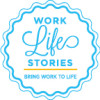Danielle’s best advice to her son and daughter? Choose a life, not a job. This is precisely what Danielle* and her husband have done. They recently moved from Boston, MA to Basel, Switzerland. They’ve chosen a life for themselves and their children. Danielle isn’t an expat, she is a local employee at her Swiss company. It’s a long term commitment. And it was a big move, especially since the area is German-speaking and her family didn’t speak the language.
Choice and Control
Why Basel and why now? Danielle is clear in the definition of her own values. The world is big and she wanted a life rich with that expanded view. Taking the role in Switzerland allows her to experience more that the world has to offer. For Danielle, work-life integration is about being able to focus and be present in every moment – whether it is at work or at home or in leisure or volunteer activities. Finding fulfillment in work-life is also about choices and control. When Danielle’s 8-year old daughter was adjusting to the move, Danielle needed to put additional focus on her family. She took time for playdates during which she connected her daughter with children of colleagues who were closely matched in age. Being able to control her schedule and flex toward that necessary time was critical.
Context
We could learn a lot from this Swiss perspective on work: the rules are very different. For example, the government monitors work hours to be sure they do not go beyond 40 per week. This leads to a much greater emphasis on clocking in and out – at all levels of the organization – so that hours do not become excessive. It’s even illegal, according to Swiss law, for people to work on Sundays. This means that grocery stores are not open on Sundays. While this took some getting used to for Danielle (“What if I run out of milk?”), it was a welcome transition. Sundays are for family, hiking, enjoying the mountains, and each other. People in Switzerland also take their vacations (what a concept!) and when they are out, it is typical for workers to have others step into their shoes so they are not behind in their work when they come back. This is true even for the most senior-level staff members. An added bonus? The employees who are replacing the staff members reap the benefits of developing new skills. The magic of this system isn’t the policies or practices, however. It is the context. There is a clear message throughout the culture – from both the government and organizations – that ‘life is more than work’. This belief allows people to really stop working when work is over and to focus on family, leisure activities, and whatever else brings them a sense of abundance.
Mass Transit
Danielle says that the public transportation in Switzerland in amazing. It is ubiquitous, safe, and always runs on time. While this seems like a mundane perk, it is anything but. This kind of mass transit removes a source of friction. Danielle’s 13-year old son bikes or takes the tram to school and to soccer practice. Her young daughter walks by herself. Parents aren’t involved in transporting their children to and fro. In fact, doing so would be frowned upon. This frees up a tremendous amount of time and energy on the part of parents, and fosters a sense of independence in children. This is possible largely because of safety. It takes a village. In Basel there is a general sense of attending to the needs of children, wherever they are and whatever they are doing. It is safe for children to be independent and to spread their wings within the community.
Peace, Calm, Focus
The overwhelming feeling of Danielle’s work-life experience in Basel is one of peace, focus, and calm. Basel lacks the undercurrent of rushing, hurrying, multi-tasking, and fitting it all in. But short of moving to Basel, what’s an American to do? While we may not be able to replicate the Swiss laws regarding working hours here in the U.S., we can
- Reconsider our children’s transportation. Are there safe alternatives for them to go places on their own? Or expanded possibilities for ride-sharing with other families?
- Take the vacation time that we’ve earned and encourage co-workers to do the same.
- Advocate at our organizations for a ‘replacement’ approach in which employees who are on vacation are covered by others so they are not underwater when they return from their break.
- Protect our weekend time for ourselves, and be sure we have enough milk in the house, come Sunday.
Aside from these tactics, I think the biggest lesson is to foster a sense of focus – being truly present in the moments of work, family, or leisure. Danielle has made a life and expanded her family’s world view. She’s expanded mine too.
*Danielle Hartmann is an HR Specialist, Diversity & Inclusion at F.Hoffmann-La Roche in Basel Switzerland.
Would you like to tell your story? If so, let me know by emailing me at tbrower108@gmail.com. Why? One of the foundations of Bringing Work to Life is abundance: the idea that it is possible to find fulfillment, have it all, and avoid the trade-offs between work and life. After all, work and life aren’t separate things to be placed in containers, but part of an integrated whole of a satisfying life. Another foundation of Bringing Work to Life is the idea of multiple right answers. As we’re all seeking ways to bring work to life – and bring life to work – we can learn from each other’s unique solutions and stories. I’d love to learn about your story!
